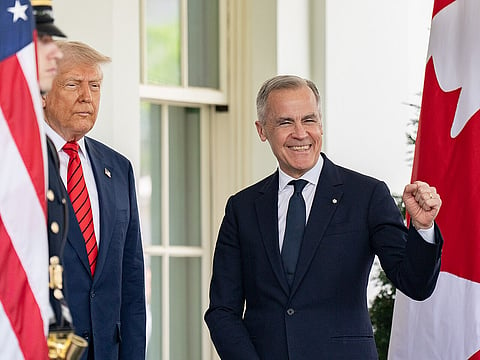

Canadian Prime Minister Mark Carney confirmed on Wednesday that "high-level" discussions are underway with the United States regarding Canada’s potential participation in the proposed "Golden Dome" missile defense system. The initiative, unveiled by U.S. President Donald Trump on Tuesday, aims to counter advanced aerial threats, including hypersonic missiles and space-based weapons.
Trump announced an initial projected cost of 175 billion for the system, which he claimed would be operational by the end of his second term in 2029. However, the nonpartisan U.S. Congressional Budget Office estimates the total cost could exceed 542 billion over two decades, factoring in space-based components.
Speaking to reporters after a cabinet meeting, Carney acknowledged Canada’s interest in the program but declined to specify potential financial contributions.
"We are conscious that we have an ability, if we so choose, to complete the Golden Dome with investments and partnership," Carney said. "But these are military decisions, and we will evaluate them accordingly."
The discussions come amid ongoing trade and security negotiations between the two nations. Tensions have escalated since Trump recently suggested Canada would be better off as a U.S. state and threatened steep tariffs—remarks that fueled a surge of Canadian patriotism and bolstered Carney’s Liberal government in last year’s election.
Audrey Champoux, a spokeswoman for Carney, confirmed that strengthening NORAD (the North American Aerospace Defense Command) and related initiatives like the Golden Dome are part of broader bilateral talks.
Experts have questioned the feasibility of a missile defense system on the scale proposed by Trump, citing technological challenges and exorbitant costs. The U.S. military has yet to provide a detailed implementation plan, and analysts doubt the system could be completed within Trump’s stated timeline.
Canada and the U.S. already collaborate through NORAD, a decades-old framework for aerospace and maritime defense. Both nations have been negotiating upgrades to modernize the command, but the Golden Dome proposal represents a far more ambitious—and costly—endeavor.
As Ottawa weighs its options, Carney emphasized a cautious approach: "It is good to have protections in place for Canadians, but we must assess what role Canada should play in such a system."
Meanwhile, Canada has sought to diversify its defense partnerships, including a recent agreement with Australia to develop Arctic radar systems and a review of its planned purchase of U.S.-made F-35 fighter jets.
Trump, however, remains optimistic about Canada’s involvement, stating, "They want protection too, and as usual, we’ll help Canada."